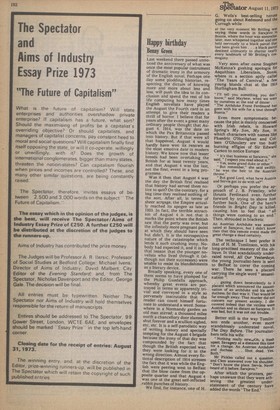Happy birthday
Benny Green
Last weekend there passed unnoticed the anniversary of what was once the most popular instrument of dramatic irony in the armoury of the English novel. Perhaps one day some plodding historian, respecting the dictum of knowing more and more about less and less, will push the idea to its conclusion and spend the rest of his life computing how many times English novelists have played the August the Fourth card in an attempt to give their readers a thrill of horror. I believe that for years after the event a great many ordinary people thought that August 4, 1914, was the date on which the Pax Britannica passed into history. But if that were all that happened, August 4 would hardly have won its renown as the most emotive date in modern history. We know now that lesser breeds had been overtaking the British for at least twenty years, and that August 4 was the last, not the first, event in a long programme.
Was it then that August 4 was the day the British first realised that history had served them notice to quit? On the contrary, for a loig time they realised nothing of the sort, After all, in terms of sheer acreage, the Empire actually reached its apogee as late as 1933. In fact, the terrible attraction of August 4 is not that it marks the point where the British saw that the party was over, but the infinitely more pregnant point at which they should have seen but didn't. It is the retrospective nature of the catastrophe which lends it such crushing irony. Nobody had expected it, and it is for that reason that the younger novelists who lived through it (although not their successors) were unable to resist its blandishments as_a literary device.
Broadly speaking, every one of them seems to have plumped for the Philip Guedalla approach, whereby great events are portrayed in terms so apparently trivial and conveyed in a style so perversely inscrutable that the reader can count himself fortunate to understand a word. Somewhere in a Normandy garden an old man stirred; a thousand miles north a chancellory door slammed shut forever and a scullion sighed, etc, etc. It is a self-parodistic way of writing history and specially tempting for the August 4 brigade because the irony of that day was compounded by the fact that though the British expected war, they were looking for it in the wrong direction. Almost every fictional description of 1914 stresses the fact that it was while the English were peering west to Belfast that the blow came from the opposite quarter and that August 4 was one ot the great sell-inflicted .rabbit punches of history.
We find, for instance, one of H. G. Wells's best-selling heroes going on about Redmond and the Curragh while
at the very moment Mr Britling was saying these words in Sarajevo In Bosnia, where the hour was somewhat later, men whispered together and one held nervously to a black parcel that had been given him . . . a black parcel destined ultimately to shatter nearly every landmark of Mr Britling's cosmogony.
Very soon after came Stephen McKenna's gushing apologia for Asquithian Liberalism, Soma, where in a section aptly called ' The Years of Carnival,' a few young bloods chat at the 1914 Hurlingham Ball: "I'll tell you something you don't know," said Mayhew, when we were by ourselves at the end of dinner . • " The Archduke Franz Ferdinand has gone with his wife for a tour through Bosnia."
Even more symptomatic because the plot is mainly concerned with Irish rebels, is Howard Spring's My Son, My Son, in which characters with names like Phaedric O'Hoolighan and Colleen O'Ghoulery are too busY burning effigies of Sir Edward Carson to notice Europe: " It's that business at Sarajevo," she said, " I expect you read about it." "Yes, some grand duke or other." " But remember," she said swiftly, " he was the heir to the Austrian throne."
" But good Lord, what have Austria and Servia got to do with us?"
Or perhaps you prefer the approach of J. B. Priestley, who thrusts Ferdinand even further forward by trying to shove him further back. One of the hero's friends in Bright Day is killed, causing him to feel that "all things were coming to an end.' Then, shrouded in brackets: An Austrian Archduke was assassinated at Sarajevo, but I didn't know then that this remote event made the great change a dead certainty.
The technique 1 best prefer is that of H. M. Tomlinson, with his long-practised mastery of the oblique. In that scandalously underrated novel, All Our Yesterdays, the young journalist-hero is sent to Belfast to cover the coming war. There he sees a placard carrying the single word assassination ": . . gazing down benevolently to a placard which announced the assassination of an archduke and his archduchess. So that was it. That would be far enough away. That murder did not concern our present anxiety. I discovered indeed that the victims were Austrian and as distant as Sarajevo. It was bad, but it was not our trouble.
Better still is the way Tomlinson ends another, even more scandalously underrated novel, The Day Before. The journalisthero tells his wife: " Nothing really new...40h, a fresh upset Savagery at a distance this time tor a change, An Austrian Archduke and duchess . . Shot dead. Yea. Both.
Mr Pickles called out a question, and Clem answered over his shoulder. "Don't know the place. Servia. Never heard of it before. Sarajevo."
After which the printers, perhaps unaware that they were ach
ieving the greatest understatement of the century have added the words ' The End.'


































 Previous page
Previous page